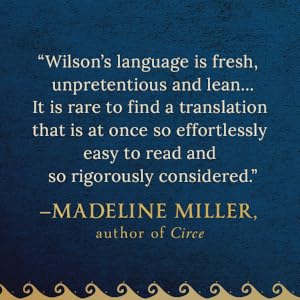Customer Services
Copyright © 2025 Desertcart Holdings Limited


desertcart.com: The Odyssey: 9780393356250: Homer, Wilson, Emily: Books Review: Wonderful and readable - This modern translation of a great epic pulsates with tension to its bitter bloody end, keeping the reader enthralled. The translation from ancient Greek strips all verbosity and in economical verses moves the story along swiftly, vividly bringing to life the story of Odysseus and the Bronze Age coastal world he lived in. It limns a portrait of Odysseus as a man determined to get home to his beloved wife and kingdom using only his wits, shrewdness, courage and resourcefulness. The last few chapters that culminate in a horrendous bloodbath feature an equally strong, courageous and shrewd Penelope and his son Telemachus. Review: Great translation — esp for High school! - Excellent rendition of the Odyssey! I love how Emily Wilson uses plain language which mimics the style of the original language of Homer — I love that you could read this story aloud and not have any trouble understanding the plot or feelings of the characters. The best translation in my opinion!






| Best Sellers Rank | #479 in Books ( See Top 100 in Books ) #1 in Ancient & Classical Poetry #1 in Epic Poetry (Books) #34 in Classic Literature & Fiction |
| Customer Reviews | 4.7 out of 5 stars 6,138 Reviews |
R**R
Wonderful and readable
This modern translation of a great epic pulsates with tension to its bitter bloody end, keeping the reader enthralled. The translation from ancient Greek strips all verbosity and in economical verses moves the story along swiftly, vividly bringing to life the story of Odysseus and the Bronze Age coastal world he lived in. It limns a portrait of Odysseus as a man determined to get home to his beloved wife and kingdom using only his wits, shrewdness, courage and resourcefulness. The last few chapters that culminate in a horrendous bloodbath feature an equally strong, courageous and shrewd Penelope and his son Telemachus.
Z**E
Great translation — esp for High school!
Excellent rendition of the Odyssey! I love how Emily Wilson uses plain language which mimics the style of the original language of Homer — I love that you could read this story aloud and not have any trouble understanding the plot or feelings of the characters. The best translation in my opinion!
M**N
Fantastic new translation
Excellent new adaptation.
L**S
Easy to read
Beautiful translation and very easy to read. I enjoyed Emily Wilson’s writing of The Odyssey, the Introduction being the most informative. Four stars because I thought the language and use of certain phrases and words were too contemporary for the time of the epic
S**M
A wonder to read
This is the fourth and best translation of the Odyssey that I have read. The ones in high school and college were turgid academic poems, stiff and formal. They were written as if the Odyssey was a poetry reading in a classical studies faculty lounge. Fagles was famous for his more relaxed, colloquial style. But even Fagles focused on telling the text rather than on who it was told to. His translation, though clearer, is still burdened by academic pretensions and prolixities. Wilson, notably the only woman, has done two remarkable things. She imagined the audience that the bards would be speaking to. Ordinary citizens, tired from work, came to relax and hear a good story well told with sly asides, a wry touch, side eyed sexual innuendos, and even bits of whimsy. I sensed in this translation, as in no other, that Wilson knew the audience who Homer was playing to. Thus she brightened her translation with the dancing reflections of how he played his audience. This is fresh approach. The second thing that she does is render the women as they were in their time, individual humans, contained by the sexist distribution of wealth and power. This translation strips off the encrustations of the sexual judgements of the 19th and 20th century translations. It lets the women breath as humans or as goddesses. It is humane.
L**N
Thrilling and poetic
Emily Wilson's new translation of Homer's Odyssey is extraordinary in so many ways. Among its many attributes is clear, and finely-tuned language set in iambic pentameter that puts the poetry back in one of the Western cannon's greatest poems. Readers need not wade through purple and overblown blank verse, twice the length of the original text to finally arrive, with Odysseus in Ithaca. His story and character, as well as those of Penelope and Telemachus are fashioned in direct, active language that lets the hero's deeds and trials, as well as those of his wife and son, impress or disappoint the reader. Reading Wilson's version was like reading The Odyssey for the first time. There has been much fuss about her choice of a few words--"complicated, canapes, tote". Those complaining can't possibly have read the work or at least not her introduction where she explains quite convincingly the choices she made and purpose in providing yet another interpretation. Wilson is equally fearless in wading into the politics of translation arguing it is chauvinism to translate the slave women/concubines as "maids or servants". More than inaccurate it distorts the unpleasant truth about Greek civilization: it was a culture sustained by slave labor (as were nearly all others at the time). She ratchets things up another notch when she takes on Robert Fagles translation of the slave girls as "sluts" and "whores" who deserve to be slain. Why she wonders if they had no agency in life can they be responsible for the deeds of men who are at best coercing sex, at worst raping them? Wilson says flat out his attitude and translation are misogynistic. She also makes convincing arguments in her introduction that Penelope is more dimensional than credited and Helen of Troy refreshingly free of guilt for deeds committed in her name. The introduction, translator's notes, maps and glossary all enhance the reader's enjoyment, making it a truly epic experience.
J**A
I thought it was going to be boring when I was in school but...
Despite being classic literature, which I once thought was only enjoyed by elitist academics, I found it to be really interesting even exciting. Wilson's translation doesn't rely on using 18th-century language in a misguided attempt to capture a feeling of antiquity, which really helps. The book starts with a lenghty but interesting discussion of the how and why of her translation as well as sharing many insights into the nature and characteristics of the gods and people portrayed. If you were expecting a dull and boring story think again.
M**I
Helpful Odyssey Translation
The book came in great condition. Needed for a college course. I definitely recommend this Emily Wilson translation of the book if you’re reading the Odyssey - it makes it a little easier to understand and it includes small summarizations of each book in the back from the author.
Trustpilot
1 day ago
1 month ago